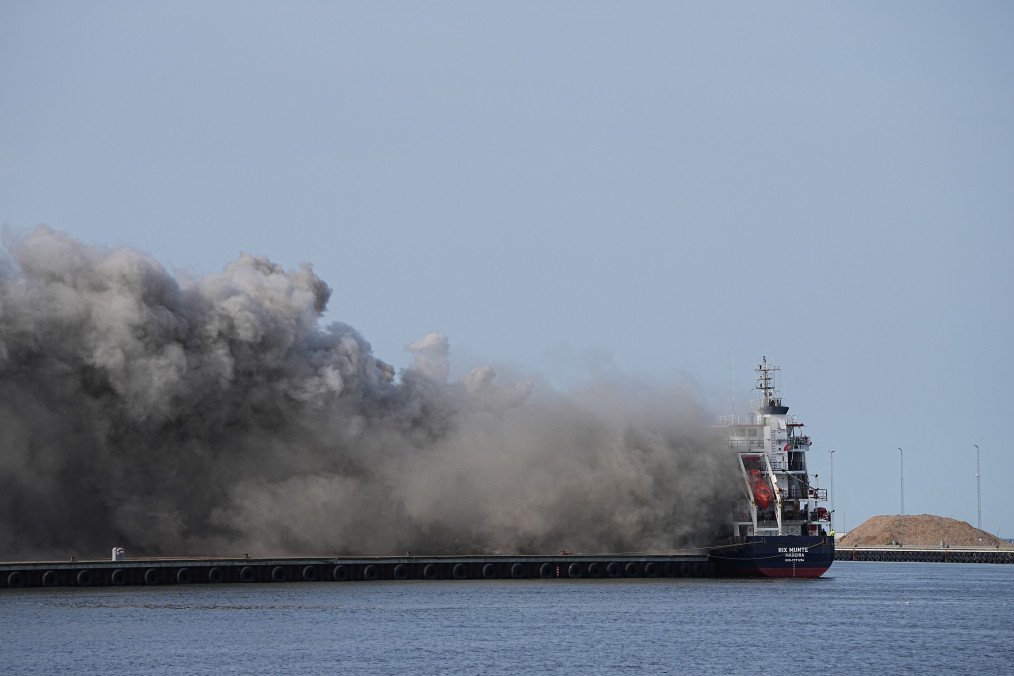- Category
- Latest news
Russian Spy Ship Reportedly Catches Fire Off Syrian Coast, Drifts Uncontrolled

A Russian intelligence-gathering vessel caught fire and temporarily lost control off the Syrian coast on Janaury 23, according to Associated Press (AP). The Kildin, a Russian spy ship equipped with surveillance technology, was seen emitting black smoke and flames as it drifted, prompting an urgent maritime radio warning to nearby vessels.
The Associated Press obtained audio of the broadcast, as well as video and photographs of the incident.
“Warship on your course,” the Russian Captain said. “I am drifting. I’m not under command.”
The videos, taken by three NATO military officials, were collected by a nearby NATO vessel. These officials spoke to AP on condition of anonymity to discuss the fire and radio transmission, which Russian authorities have not publicly acknowledged.
The incident provides insight into Russia’s fleet of spy ships, which NATO allies have closely monitored due to concerns over potential sabotage of undersea cables and pipelines amid ongoing war in Ukraine. Despite its apparent distress, the Kildin did not respond to an offer of assistance from a NATO ship, the officials said.
The 55-year-old Kildin, responsible for gathering intelligence on NATO activities in the Mediterranean, had been operating near naval exercises conducted by alliance member Turkey before the fire broke out. According to officials, the blaze lasted for at least four hours, during which the crew uncovered lifeboats but did not deploy them.
The Kildin also hoisted two black balls from its masts, a maritime signal indicating that the vessel was unable to steer. Eventually, the crew regained control, and the ship remains stationed near the Syrian port of Tartus, accompanied by a frigate and a supply vessel. The cause of the fire remains unclear.
Kremlin spokesperson Dmitry Peskov stated he was unaware of any fire aboard the Kildin and declined to specify the vessel’s mission at the time. “Assessing the state of the fleet based on the breakdown of one particular ship or one particular malfunction is not professional,” Peskov said.
Retired Vice Adm. Michel Olhagaray, former head of France’s center for higher military studies, noted that although the Kildin regained steering, the fire underscored the logistical challenges Russia faces in maintaining naval operations in the Mediterranean, far from its primary bases in the Arctic and Baltic. Due to it’s war against Ukraine, Moscow has also lost access to its Black Sea Fleet for Mediterranean patrols, as Turkey has barred warships from passing through the Bosporus.
Audio recordings obtained by the NATO vessel include a 75-second radio exchange between the Kildin and a Togolese-flagged cargo ship, Milla Moon. A separate recording, also reviewed by AP, captures NATO crew members identifying the Kildin’s transmission. Military officials provided both recordings to AP, though independent authentication was not possible.
Ship-tracking data confirms that on January 23, the Milla Moon lifted anchor off Tartus and began cruising north along Syria’s coast—the same day the Kildin caught fire. Military officials said that in an initial transmission, the Kildin falsely identified itself as another vessel, the Sky, before requesting to switch communication channels. After changing frequencies, the man speaking English with an accent identified his ship as a warship.
Satellite images from January 27, analyzed by Radio Liberty, indicated the removal of Russian military equipment from the Syrian port of Tartus. High-resolution images showed military hardware being loaded onto Sparta and Sparta II, cargo ships operated by Russia’s Ministry of Defense.
-554f0711f15a880af68b2550a739eee4.jpg)

-72b63a4e0c8c475ad81fe3eed3f63729.jpeg)


